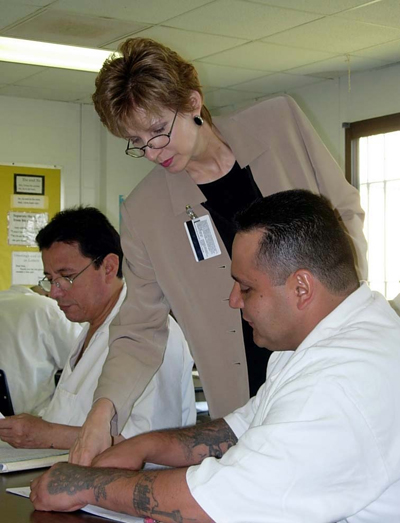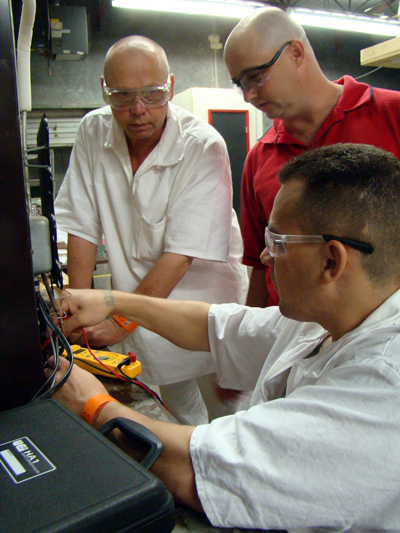SHSU Tests Prison Education Programs
Feb. 6, 2013
SHSU Media Contact: Beth Kuhles
More than 63,000 offenders in the Texas Department of Criminal Justice participated in educational programs offered by the Windham School District during the 2011-2012 fiscal year, which have been found to decrease recidivism rates, increase employment opportunities, and result in higher wages and higher levels of educational achievement among participants, a study at Sam Houston State University found.
 |
| SHSU researchers evaluated educational programs offered by TDCJ, finding that offenders who seek out education or training while incarcerated are less likely to return to prison. —Submitted photos |
 |
Faculty from the College of Criminal Justice and the Correctional Management Institute of Texas at SHSU evaluated the effectiveness of education and vocational programs offered by the school district on offender outcomes.
Among the programs included were the adult basic education program, which includes literacy training and GED preparation; the post-secondary education program, which provides continuing education in vocational and academic settings; career and technical education, which integrates career path planning and technology training to prepare offenders for the workforce; and the cognitive intervention program, which addresses thinking patterns and is designed to improve behavior.
“We know that an offender’s ability to obtain employment upon their release from prison is a critical component to their success,” said Gaylene Armstrong, associate professor of criminal justice and CMIT research director. “Basic education skills such as reading, writing and mathematical abilities, combined with vocational training opportunities such as gaining certification in a trade, are key building blocks for an offender’s success in the free world. Windham’s educational programs were very promising in this regard, even for offenders incarcerated for relatively short periods of time.”
Armstrong emphasized the importance of these programs, noting “if offenders can develop a marketable skill set while serving their sentences, it is more likely that they will be self-sustaining and refrain from criminal activity in the future.”
The study was based on offenders released from TDCJ facilities in fiscal year 2009 whose activities were followed through 2012. In the 2009 fiscal year, there were 72,218 offenders released from state prisons, with 51,058—or 70 percent—who participated in educational programs offered by the Windham School District.
Offenders who participated in adult basic education classes achieved “significantly higher” reading, math and language scores than non-program participants, and those advancements, particularly in reading, resulted in much lower re-incarceration rates among offenders, the study found. The study compared recidivism rates among first time offenders with person, property, drug and other crimes with offenders who did not participate in the Windham programs.
In addition to education and recidivism, offenders who participated in Windham educational programs generally had higher earnings than those who did not. Participants in the vocational certification programs and cognitive intervention program earned “significantly higher” wages after their release from prison, with an average of $3,010.59 and $3,180.81 earned respectively each quarter. This compared to $2,843.65 and $2,795.39 earned quarterly by those who did not take part in Windham educational offerings.
“We’re very excited about the results of this study,” said Veronica Casanova, director of the division of instruction for the Windham School District. “Not only does it demonstrate that Windham educational programs are positively impacting the lives of offenders, it validates the hard work that takes place in our schools every day.”
The findings in the report mirrored academic studies on the effects of education in correctional settings. Research has found that:
- The intensity and duration of rehabilitation programs are directly related to positive outcomes, including recidivism, for certain offenders.
- The higher the overall education level of the offender, the less likely they are to recidivate.
- Participants in educational program were 1.7 times more likely to be employed upon release to the community.
- Participation in correctional education programs result in an increased likelihood of success in obtaining and maintaining employment and higher wage earnings for former offenders.
- Offenders who participate in correctional education programs have higher rates of employment upon release and participating offenders earn higher wages in each successive year.
- Cognitive-behavioral treatment is well established as an effective method for adjusting maladaptive thinking and producing positive behavioral outcomes.
The study, entitled “Evaluation of the Windham School District Correctional Education Program,” was a collaborate effort between Sam Houston State University and Indiana University of Pennsylvania. The report is expected to be presented to various members the Texas State Legislature.
In addition to the evaluation of the effectiveness of programs, the report also highlighted some of the district achievements in the 2010-11 academic year, during which nearly 74,500 offenders participated in correctional education programs. Among those were 35,000 offenders who participated in literacy programs, more than 1,300 who were in special education, and nearly 1,000 who enrolled in ESL classes.
As a result, 5,169 GED certificates were issued to program participants, with 85 percent of those who took the test passing. In addition, more than 8,000 offenders participated in post-secondary education efforts, earning 447 associate’s degrees, 31 bachelor’s degrees and nine master’s degrees.
- END -
This page maintained by SHSU's Communications Office
Associate Director: Julia May
Manager: Jennifer Gauntt
Located in the 115 Administration Building
Telephone: 936.294.1836; Fax: 936.294.1834
Please send comments, corrections, news tips to Today@Sam.edu.

 SamWeb
SamWeb My Sam
My Sam E-mail
E-mail

